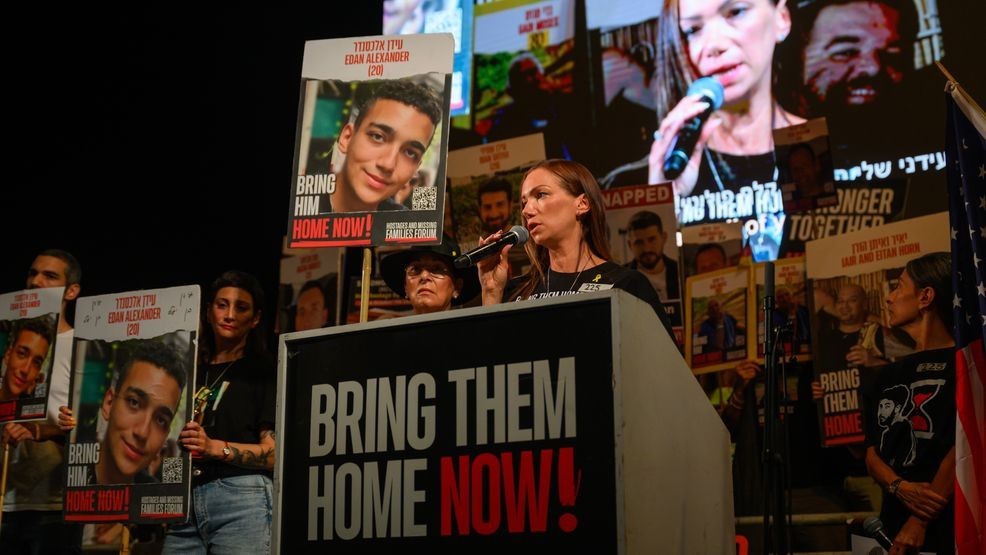(TNND) — Just three of seven American hostages in Gaza are believed to still be alive, after Israel said Monday that an Israeli American soldier was killed in the initial Hamas attack of Oct. 7, 2023.
Omer Neutra’s body remains in Hamas’ custody, along with what are believed to be six other American hostages both living and dead.
Neutra grew up in New York and held dual American and Israeli citizenship. He joined the Israel Defense Forces, where he was serving when Hamas attacked.
Hamas released a video over the weekend of another young American hostage, Edan Alexander.
Alexander was alive and speaking in the video.
Alexander was born in Israel, grew up in New Jersey, and visited Israel often to see family.
He, too, was serving in the Israeli military when Hamas attacked.
Ned Lazarus, a teaching associate professor of international affairs at George Washington University, called the Hamas-released video of Alexander “excruciating to watch and clearly intended to be so.”
Lazarus said the video featured language used in slogans by the protest movement in Israel, along with a plea to U.S. President-elect Donald Trump.
The messages in the video were obviously dictated by Alexander’s captors, Lazarus said.
Lazarus said the video appears to be an attempt by Hamas at political pressure on Israeli Prime Minister Benjamin Netanyahu to bend to its demands for a ceasefire and hostage release.
“Hamas is clearly using this to demonstrate that they still have some negotiating position. … The fact that they showed a video of an American Israeli is also playing to the U.S. constituency,” said Mark Schwartz, a retired lieutenant general in the U.S. Army and a senior fellow at RAND.
“As horrific as it is, proof of life is a huge deal,” Schwartz added.
He said Israeli and American intelligence teams are likely analyzing the video for any clues on when and where it was recorded.
“I think as each month goes by, what’s important is that the likelihood of additional hostages coming out alive is deteriorating,” Schwartz said.
Hamas has held the hostages for over 400 days now.
About 250 people were originally captured.
The Washington Post reported last week that over 60 living hostages remain in Gaza, close to 120 have been freed or rescued, and over 70 hostage deaths have been confirmed. Around three dozen hostage bodies haven’t been recovered.
Lazarus said polling of the Israeli public shows majorities think Israel should end the war with Hamas if the hostages are released.
But the sides appear to remain far apart in their demands for a ceasefire.
Israel is absolutely committed to its strategic objective of eliminating Hamas’ military and political capability, Schwartz said.
Hamas wants a complete Israeli withdrawal from Gaza and an end to the war, Lazarus said.
He pointed to reports of renewed negotiations, led by Egyptian officials, which could be related to Israel’s new fragile ceasefire with Hezbollah terrorists to the north.
Schwartz said Israel faces a completely different strategic situation with Hezbollah, which began attacking Israel regularly following the Hamas attack in a show of support for another Iran-backed terrorist group.
But Lazarus said some people hope Hamas will feel more isolated if it doesn’t have an ally attacking Israel constantly, and that might be what spurs Hamas to work on a deal to end the war.
“The grand vision of a multifront war on Israel is really disappearing,” Lazarus said.
But who is the voice for Hamas?
Hamas’ leader and the reported mastermind of the Oct. 7 attacks, Yahya Sinwar, was killed in October. Before that, Hamas’ political head, Ismail Haniyeh, was killed.
From the outside, it’s not clear who is leading Hamas or how unified the group is with its approach to the war.
Lazarus pointed to reports that Yahya Sinwar’s brother Muhammad has become a very influential figure within the group.
But Lazarus said there are a lot of contradictory reports coming out of the region.
And he said there’s a lot of debate within Israel as to how committed Netanyahu is to securing the release of the hostages versus appeasing hard-right factions of his government that help keep him in power.
Neither Schwartz nor Lazarus offered an optimistic outlook for a ceasefire.
Lazarus said the public might not be aware of all the negotiations taking place.
But, he said, “There is no explicit reason to be hopeful at the moment.”
